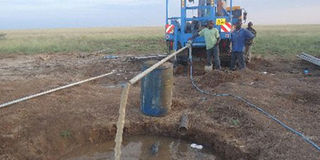Private sector vital in harnessing water

Workers at one the sites where 250 billion cubic meters of underground water reservoir was discovered in Lotikipi, Turkana County in September 2013. FILE
What you need to know:
- The provision of water to the public comes with many problems, including challenges of goodwill, political uncertainties, and heavy capital inlay.
- Local investors, saccos, individuals, and investment groups should be encouraged to invest in water.
News that massive underground aquifers had been discovered in Turkana were greeted with jubilation. This was understandable, considering that Kenya is classified as a water-scarce nation.
However, exploiting such a resource requires huge monetary and technical investment. This means that left to the government alone, Kenyans may not see the benefits of the Turkana aquifers any time soon.
This brings to mind the question: must all water projects be carried out by the government? Does the private sector have a role to play in the development of water projects?
The good news is that sector players including the government, financiers, donors, and water service providers are in discussion to explore the possibility of engaging Kenya’s public-private partnership (PPP) framework. The ideas are varied but the consensus is that the private sector has a core role to play in the development of water projects in the country.
The sector players now need to integrate the enacted PPP framework in the water realm. Unfortunately, the private sector has in the past steered clear of major public water investment projects and instead chosen lucrative side businesses like water bottling.
The provision of water to the public comes with many problems, including challenges of goodwill, political uncertainties, and heavy capital inlay.
However, for the country to develop and meet is domestic and industrial water needs, the private sector must be engaged. Water is a critical ingredient of industrialisation. Indeed, this is how the major industrial zones of the world emerged.
In Kenya, there are massive inefficiencies, wastage, low capacity, and limited expansion in the water sector. Rural folk still treks kilometres to fetch untreated water. Those who live in towns suffer chronic dry taps.
Yet, availability of safe, affordable, and reliable water is considered to be a human rights concern, therefore there is a need to carefully balance commercial interests and the people’s rights and dignity.
SACCOS
As a water-starved nation, Kenya needs efficient and innovative ways of harnessing water. This does not need to involve mega dams that cost billions of shillings.
The PPP concept can be designed in such a way that a single well connected to a mega dam through a network of pipes can serve a whole village. Another myth is that only international companies can invest in water. Local investors, saccos, individuals, and investment groups should be encouraged to invest in water.
These engagements can be in the form of build-own-transfer, build-own-operate, and build-own-operate-transfer financing model. It can also be in the form of rehabilitating run-down projects.
The investor will need an enabling environment such as political and community goodwill to be comfortable investing in such projects.
The fact that some water development components are tax-free is an indication of the willingness of the State to supporting improvement of water supply.
With the steadily rising population, shrinking water sources, and thirst for industrial growth, the need for a well-designed water master plan has never been more urgent. Its time to hook private money to water development.
Mr Wamanji is a communications consultant and teachers media studies at Daystar University. [email protected]. @manjis





